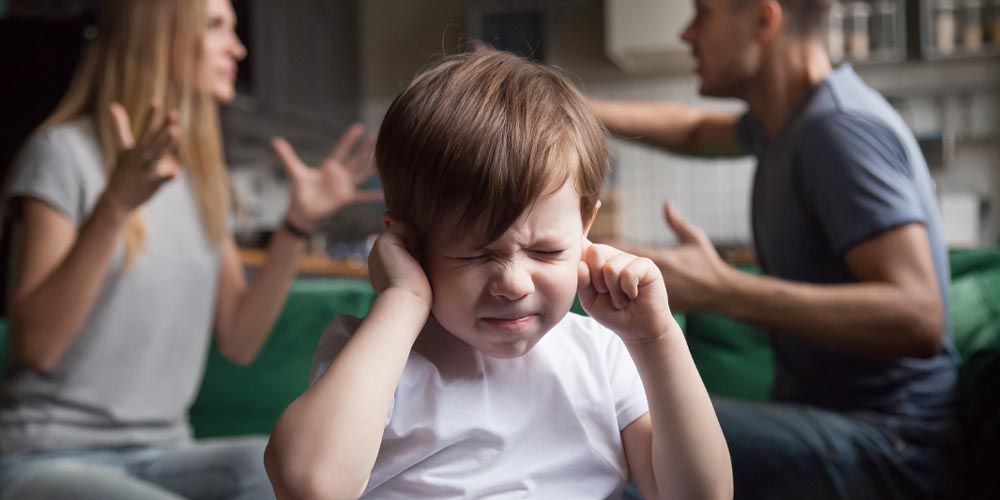Going through a divorce is not only difficult for the partners but for the entire family as well. The situation after a divorce between the parents can be very distressful for children to accept. They undergo emotional turmoil and anxiety—the biggest challenge is to choose between their parents and fear of losing the other. While some children might accept the fact, others may have to struggle with the transition.
However, children can bounce back when adequate attention is given and professional assistance is sought during the transition phase. The common problems with children, whose parents are undergoing a divorce, are:
- They feel agitated and angry: It’s very difficult for kids to understand and accept the situation of divorce of parents. Kids begin to show signs of anger and agitation. Some children even blame themselves for their parents’ divorce and express their frustration on others. They are constantly gripped with the fear of losing their parents.
- They are likely to become socially isolated: Kids are social butterflies but they tend to retract into a shell of shyness and anxiousness when their parents are divorced or heading towards one. Such children avoid social gatherings, school events and stop hanging out with friends. They develop low self-esteem due to the divorce situation. Inner dialogue and boosting their self-confidence can help them come out of the shell.
- They might under-perform in academics: It’s is seen that children under-perform in academics and their grades dwindle due to the divorce situation. Children aged 13-18 years have potentially higher chances of dropout from schools. The child might be feeling depressed, neglected, and anxious or distracted from growing conflicts between the parents.
- Children deal with separation anxiety: Separation anxiety is quite common in younger children between six and 18 months. However, toddlers and older kids might show signs of excessive crying and clinginess in absence of parents. Some kids may respond well to visual calendars mentioning clearly their parents’ visitation and consistent routine with parents.
- Children may show signs of regression: Toddlers and preschoolers between 18 months and six years of age may exhibit signs of regression such as bedwetting, clinginess, tantrums and thumb-sucking. Signs of regression can be worrisome as these are signs of stress the little one is going through. Parents might not find ways to help their kids, but with profession help, continual reassurance and consistently providing an empathetic and safe environment can assist the little one to cope through the transition stage.
- Change in sleeping and eating pattern: Studies reveal that children undergoing an adverse phase of divorce, especially children around six years, show a change in BMI (Body mass index change). They start experiencing sleep regression and weight gain issues. Other signs may also appear such as having nightmares or visualizing some monster in their dreams. Due to sleep irregularities their agitation and anxiety increase.
- They may pick sides: When parents have conflict, research have evinced that children go through loyalty conflict and cognitive dissonance. They are stuck in a very uncomfortable situation and don’t know where to go and which parent to choose. Physical symptoms such as stomach aches or headaches are quite prevalent in the situation. Eventually the loyalty conflict gets concrete as the child gets older and they break up completely with one parent. The choice of parent can also change with time.
- They might go through depression: Many studies have shown that children who have gone through a divorce situation have potentially a greater risk of developing depression. Initial symptoms of depression start with loneliness, sadness and feeling low. But eventually, suicidal thoughts or behavior tend to develop. Children above 11 years of age, especially boys, are at greater risk of depression.
- Engaging in risky behavior: Studies have shown that children of divorced parents swerve towards substance abuse or alcohol addiction to numb their overwhelming emotions. They also develop sexually risky behavior due to their negative perception regarding marriage and child bearing.
- They develop trust issues and relationship problems: Divorce of their parents changes the perception of marriage in children. They develop trust issues and relationship problems in their personal life. They become fearful of commitment in a relationship. Divorce also gives them a chance to view alternative family model. It is seen that children of divorced parents don’t commit to marry, rather they opt for live in relationships.
How to help your children cope with divorce?
Divorce is an overwhelming situation for both, the parents and their kids. It’s not easy to convey the situation to your kids. However, patience, love, care and empathy can create a safe place to wade through the difficult time. It is advisable to show your emotions to your kids, this will help them understand your situation. Allow your children to talk to you so that you know exactly what their emotions are. Try to resolve conflict between you and your partner in a healthier way and create a safe atmosphere at home.
Reach out for professional help
Family support is imperative when children are going through a transitional phase of divorce. As parents, if you observe any worrisome signs of regression, agitation and physical symptoms such as sleep regression and stomach aches and these symptoms are not subsiding despite of your efforts, opt for professional counseling immediately. We, at Athena can help you deal with the situation, steering you from the predicament.
Athena behavioral health provides quality mental health treatment in India. We, as a mental health rehabilitation center, are among the best in the country offering luxurious and modern amenities.
To know more about our treatment programs contact us today at our toll free number 9289086193.
To know more about : bipolar disorder treatment in gurgaon, Best Psychiatric center in Delhi gurgaon, Best De Addiction Centres in Delhi, Detox Centers in India






